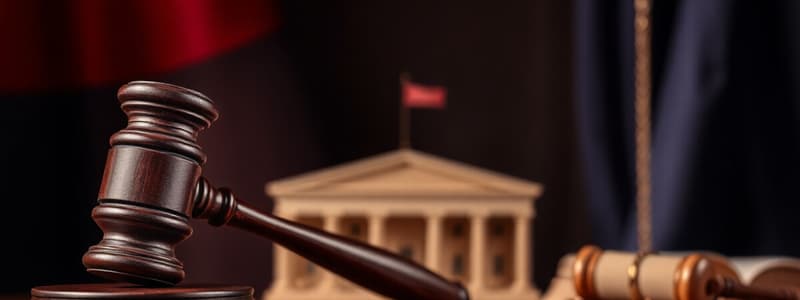Podcast
Questions and Answers
What are the three branches of power that are defined in the constitution?
What are the three branches of power that are defined in the constitution?
The three branches of power are the legal, executive and judicial branches.
What is the name of the legal doctrine that binds courts to follow precedents set by earlier decisions?
What is the name of the legal doctrine that binds courts to follow precedents set by earlier decisions?
- Ratio decidendi
- Stare decisis (correct)
- Obiter dicta
- Ultra vires
The Irish Constitution can be amended through a simple majority vote in the Dail.
The Irish Constitution can be amended through a simple majority vote in the Dail.
False (B)
Which of the following is NOT a power of the Irish President?
Which of the following is NOT a power of the Irish President?
What is the name of the principle that guides the interpretation of the Constitution when there is ambiguity?
What is the name of the principle that guides the interpretation of the Constitution when there is ambiguity?
The Seanad is a purely elected body with no nominated members.
The Seanad is a purely elected body with no nominated members.
What is the primary source of law that establishes powers for a subordinate legislature in Ireland?
What is the primary source of law that establishes powers for a subordinate legislature in Ireland?
What is the name given to a legal act that exceeds the powers granted to a person or body by law?
What is the name given to a legal act that exceeds the powers granted to a person or body by law?
The Irish legal system is based entirely on common law principles.
The Irish legal system is based entirely on common law principles.
What body is responsible for determining whether a judge should be removed from office in Ireland?
What body is responsible for determining whether a judge should be removed from office in Ireland?
The Irish President has the power to veto legislation passed by the Dail Eireann.
The Irish President has the power to veto legislation passed by the Dail Eireann.
What is the name of the legal principle that dictates that international treaties are not binding in Irish domestic law unless they are incorporated by legislation?
What is the name of the legal principle that dictates that international treaties are not binding in Irish domestic law unless they are incorporated by legislation?
Which of the following is an example of a power that is specifically conferred on the Irish President by the Constitution?
Which of the following is an example of a power that is specifically conferred on the Irish President by the Constitution?
Flashcards
What is the Constitution?
What is the Constitution?
The Constitution is the supreme law of Ireland, outlining the basic principles and rules governing the State.
Branches of Power
Branches of Power
The Constitution outlines three branches of power: legislative (making laws), executive (carrying out laws), and judicial (interpreting laws).
Fundamental Principles
Fundamental Principles
The Constitution emphasizes core values such as national sovereignty, democracy, and the separation of powers.
Article 2 & 3
Article 2 & 3
Signup and view all the flashcards
Article 5
Article 5
Signup and view all the flashcards
Role of Judicial Review
Role of Judicial Review
Signup and view all the flashcards
Flexibility of the Constitution
Flexibility of the Constitution
Signup and view all the flashcards
Ratio Decidendi
Ratio Decidendi
Signup and view all the flashcards
Obiter Dicta
Obiter Dicta
Signup and view all the flashcards
One Judgement Rule
One Judgement Rule
Signup and view all the flashcards
Persuasive Precedents
Persuasive Precedents
Signup and view all the flashcards
Statutory vs. Constitutional Interpretation
Statutory vs. Constitutional Interpretation
Signup and view all the flashcards
Harmonious Interpretation
Harmonious Interpretation
Signup and view all the flashcards
Historical Interpretation
Historical Interpretation
Signup and view all the flashcards
O'Meara Case
O'Meara Case
Signup and view all the flashcards
Natural Law
Natural Law
Signup and view all the flashcards
People (DPP) v O'Shea
People (DPP) v O'Shea
Signup and view all the flashcards
Heneghan v Minister for Housing
Heneghan v Minister for Housing
Signup and view all the flashcards
Dail Elections: Who can vote?
Dail Elections: Who can vote?
Signup and view all the flashcards
Dail Elections: Who can be elected?
Dail Elections: Who can be elected?
Signup and view all the flashcards
Secret Ballot
Secret Ballot
Signup and view all the flashcards
Seanad Composition
Seanad Composition
Signup and view all the flashcards
Subordinate Legislatures
Subordinate Legislatures
Signup and view all the flashcards
Ultra Vires
Ultra Vires
Signup and view all the flashcards
Henry VIII Clauses
Henry VIII Clauses
Signup and view all the flashcards
City View Press v AnCo
City View Press v AnCo
Signup and view all the flashcards
McGowan v Labour Court
McGowan v Labour Court
Signup and view all the flashcards
Parliamentary Privilege
Parliamentary Privilege
Signup and view all the flashcards
Administration of Justice
Administration of Justice
Signup and view all the flashcards
McDonald v Bord na gCon
McDonald v Bord na gCon
Signup and view all the flashcards
Zalewski v Adjudication Offices
Zalewski v Adjudication Offices
Signup and view all the flashcards
Judicial Independence
Judicial Independence
Signup and view all the flashcards
Delaney v PIAB
Delaney v PIAB
Signup and view all the flashcards
Executive Power
Executive Power
Signup and view all the flashcards
Prerogative Powers
Prerogative Powers
Signup and view all the flashcards
President of Ireland
President of Ireland
Signup and view all the flashcards
Republicanism
Republicanism
Signup and view all the flashcards
Dualist System
Dualist System
Signup and view all the flashcards
European Communities Act 1972
European Communities Act 1972
Signup and view all the flashcards
Webb v Ireland
Webb v Ireland
Signup and view all the flashcards
Barlow v Minister for Agriculture
Barlow v Minister for Agriculture
Signup and view all the flashcards
Friends of the Irish Environment v Government of Ireland
Friends of the Irish Environment v Government of Ireland
Signup and view all the flashcards
Burke v Minister for Education
Burke v Minister for Education
Signup and view all the flashcards
Study Notes
Constitutional Frameworks
- Ten topics covered in lectures: introduction to constitution, fundamental principles/basic values, judicial review, Dail/Seanad elections, legislative power, administration of justice, judicial independence, executive power, and president/international relations.
- Four corresponding tutorial topics: interpreting the constitution, legislative power, judicial power, and executive power.
- Important to review recent Supreme Court rulings on Seanad.
Topic 1: Introduction to the Constitution
- The constitution is the fundamental law of the state.
- There are three branches of power in the constitution: legal, executive, and judicial.
Topic 2: Fundamental Principles and Basic Values
- The constitution refers to the nation, detailing its inalienable, indefeasible, and sovereign rights.
- Original articles 2 & 3 were amended after the Good Friday Agreement, resolving issues regarding Irish unity with Northern Ireland.
- The proclamation outlines the sense of national identity.
- The 1937 preamble defines the nationality of Ireland as "We the people of Éire".
- Revised articles 2 & 3 define the entitlements of Irish citizens as birthrights.
- Article 3 emphasizes uniting the people of the island, excluding Great Britain's influence.
Topic 3: Role of Judicial Review
- The constitution has two key meanings: (1) rules and principles for government, and (2) a single written instrument encompassing fundamental rules.
- All states possess at least one, and most have two, written constitutions.
- Constitutions can be viewed as either flexible or rigid.
- Precedent plays a crucial role in the Irish legal system.
- Court decisions form sources of law, establishing precedent.
- Earlier decisions bind lower courts and the same court during future cases.
- Ratio decidendi is the legal rule or principle determining the outcome in prior cases.
- Earlier court considerations of facts and relevance are paramount.
Topic 4: Dáil Elections & the Seanad
- Court cases: Quinn v Waterford Corp and Kelly v Minister for the Environment deal with electoral rights for various parties.
- Dáil elections: Eligibility requirements include age 18, Irish citizenship, and non-disqualification by law.
- Non-discrimination and equal opportunity in the electoral process.
Topic 5: Legislative Power
- The state's legislative power is held by the legislature, making laws for creation or recognition of subordinate legislatures, and defining their power and functions.
- Subordinate legislatures don't exist under the Irish Constitution.
- Ministers and other bodies are empowered to create rules and regulations under authority granted by the Oireachtas (Irish parliament), acting within the boundaries of article 15.2.2.
Topic 6: Legislative Power Concluded
- Parliamentary privilege protects utterances and publications in either House.
- Members are not amendable to courts or authorities outside the House regarding such matters.
- The Houses have power over their debates, documents, and members' private papers.
Topic 7: Administration of Justice
- Only judges can administer justice.
- The 1937 constitution identified potential problems related to justice administration prior to 1937, as per article 37.
- McDonald v Bord na gCon provides a five-point test for defining the administration of justice. Key considerations include disputes over legal rights, determination of those rights, liability or penalty imposition.
Topic 8: Judicial Independence
- Judicial independence involves separation of powers; legislative and executive cannot dictate judicial decisions.
- The constitution allows political appointees for judicial decisions, though it also has provisions for judge appointments.
- The role of the judiciary is to uphold the law independently of political pressures to benefit the entire public.
Topic 9: Executive Power and Prerogative
- Executive power resides in the government—not the president.
- The Dáil (Irish parliament) plays a key role in legislative processes: selecting the Taoiseach (Prime Minister), approving/appointing ministers, holding the government responsible, and scheduling general elections—along with the President.
- Prerogative power—in the context of former British governance—is an inherent aspect of state sovereignty, granting the state the power to control the entry and presence of non-citizens.
Topic 10: Presidents and International Relations
- The president of Ireland is largely ceremonial with limited power.
- Elections are held directly by the people, with eligibility requirements of Irish citizenship.
- The nomination process for presidential candidates and tenure limits (two terms) are explained.
- The President's role involves symbolic functions and representing the state internationally with limited direct power.
Studying That Suits You
Use AI to generate personalized quizzes and flashcards to suit your learning preferences.





